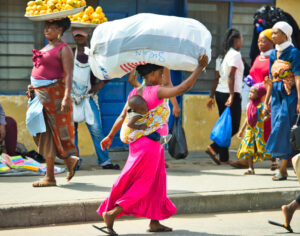Musu was a young woman living in a remote village in southern Sierra Leone, where the healthcare system was non-existent. When she became pregnant with her first child at 17, Musu knew she would have to travel a long distance to reach the nearest hospital.
When she went into labour, she rushed to a nearby town on a motorcycle on a dirt, pothole-ridden road. By the time they arrived at the hospital, after two hours, she was exhausted and in severe pain. The doctors were overwhelmed by the large number of patients. Musu had to wait more hours to see any health worker. When a doctor finally showed up, he told her that due to prolonged labour, she needed an operation to deliver the baby. The hospital did not have the necessary equipment to carry out the delivery safely.
They put her in an ambulance to the next town, and just as she was being rushed into the operating theatre, Musu passed away. Musu’s death is a tragedy that could have been prevented if she had access to a proper healthcare system.
Just like Musu, thousands of women and girls die each year during childbirth globally. According to the World Health Organisation, an estimated 800 women die every day from preventable causes related to pregnancy and childbirth. In Sierra Leone, 1,360 women die for every 100,000 live births.
Access to reproductive health remains a significant challenge to women’s health and rights today. Sexual and reproductive health rights and justice (SRHRJ) is a human rights approach that emphasises the right of all people to make decisions about their bodies, sexuality, and reproduction. It also includes the right to access quality sexual and reproductive health services, including contraception, safe abortion, and prenatal care. Although SRHR is a human right, women and girls are often denied access to these facilities because of several factors, such as how they choose to identify, gender inequality, poverty, lack of access to information and health services and even lack of confidentiality.
Investing in sexual and reproductive health rights and justice is of utmost importance as it has significant social and health implications, as well as economic benefits. When we ensure access to comprehensive sexual and reproductive health services, we uphold the right of individuals to make autonomous decisions about their bodies, which in turn protects them from discrimination and violence based on their sexual and reproductive choices.

On the other hand, the adverse effects of lack of access to Sexual and Reproductive Health (SRH) facilities extend beyond individual women and girls; it has a ripple effect on families, communities, and nations, significantly impacting the economy. For instance, with high rates of unintended pregnancies, there may be more children who are inadequately cared for, resulting in malnutrition and problems with education and social development. A 2019 study by the Guttmacher Institute estimated that the global cost of unintended pregnancies was $3 trillion per year. Every year, over $15 billion in productivity is lost due to maternal and newborn deaths, which is a significant burden on developing nations.
We all must view sexual and reproductive health rights and justice as a moral imperative because every person has the right to make informed decisions about their own bodies.
Where’s the investment for SRHR?
The importance of investing in sexual and reproductive health rights and justice cannot be overemphasised. Firstly, by ensuring access to contraception and family planning services, individuals can make informed choices about their reproductive health, leading to healthier and planned families. This, in turn, decreases the number of unintended pregnancies, allowing women to participate more fully in the workforce and contribute to economic growth.
Accessible and affordable SRH services can prevent unintended pregnancies, thereby decreasing the demand for abortion services and leading to lower healthcare costs for both individuals and society. Investing in sexual and reproductive health rights and justice can contribute to a healthier population, resulting in fewer health complications and reduced healthcare expenditures in the long term.
Moreover, by ensuring that women and girls have access to comprehensive healthcare services, including reproductive health services, we can empower them to make informed decisions about their bodies and lives, which advances gender equality and women’s overall well-being. Ensuring healthcare can break the cycle of poverty and contribute to economic growth.
When we prioritise rights and access to sexual and reproductive health services, we ensure that women have access to safe and quality healthcare during pregnancy and childbirth, reducing the risk of complications and maternal deaths.
Investing in sexual and reproductive health rights also means investing in comprehensive sexuality education, which equips individuals with the knowledge and skills necessary to lead healthy sexual lives. This education helps reduce the burden of sexually transmitted infections, promotes healthier populations, and saves healthcare costs. We must realise that preventing and reducing sexually transmitted infections is a crucial aspect of investing in sexual and reproductive health rights and justice, especially in a time like this when the world is using its last resort of antibiotics. This includes promoting the use of barrier methods such as condoms, increasing access to affordable and accurate testing, and implementing comprehensive sex education programs.
There are also legal and human rights considerations in investing in sexual and reproductive health rights. We must ensure that individuals can make autonomous decisions about their reproductive health and are empowered to lead healthier, more fulfilled lives. Investing in these rights helps to protect individuals from discrimination and violence based on their sexual and reproductive choices. And can create a society that values autonomy, respects diversity and promotes the overall well-being of its citizens.
Finally, we must note that discrimination and violence based on sexual and reproductive choices not only violate the fundamental rights of individuals but also perpetuate gender inequality and hinder social progress.
Reproductive justice for all?
During the 10th Annual African Conference on Sexual Health and Rights (ACSHR) hosted by Purposeful, hundreds of individuals from across the World gathered in Sierra Leone not just to learn and unlearn but to demand bodily autonomy and access to reproductive health services regardless of their identity. And just like everyone who was in that room, we dream of a world where individuals possess the knowledge, skills and tools to navigate their sexual and reproductive health and rights without fear of prejudice. This is achievable if and only when everyone, regardless of religion, race, gender and sect, has access to comprehensive sexuality education that goes beyond contraceptives and STIs and includes vital topics such as consent, healthy relationships, safe abortion, gender equality, etc. Achieving true requires collective work.
Governments can play a vital role in ensuring national productivity by dedicating a significant portion of their budget to SRHR. Studies have shown that young people are more likely to seek sexual and reproductive health services when they feel safe and are offered a measure of confidentiality. Comfort, safety, and confidentiality are of the utmost importance, especially for young people when seeking sexual and reproductive health services.

Governments should offer financial assistance to underprivileged communities and even invest in mobile clinics tailored to meet the needs of young people, especially women and girls, in hard-to-reach areas, which can create wider accessibility. However, young people should be the champions of this. They should be at the forefront of implementing what this should look like, how it should be delivered to their communities and the best ways to reach them without fear of judgment and ridicule.
Additionally, training healthcare providers in SRH guarantee high-quality care while ensuring the services are available, affordable and confidential. Hospital staff can also be trained to offer services via mobile phones, the internet, and social media, which is an excellent way to provide SRH services to young people, especially when most are internet savvy. SRH providers can provide answers and recommendations to young people who feel less confident about going to physical clinics to seek SRH care and services.
We call on funders to step up and provide flexible grants directed towards SRHR programs in developing nations, alongside investments in research for improved technologies and interventions. Furthermore, advocating for increased government funding for SRH services is another powerful tool at their disposal.
We must ensure that established policies, such as the Maputo Protocol, guaranteeing access to SRH facilities translate into tangible action. Only through collective effort can we guarantee that everyone has the opportunity to access the comprehensive SRH services and facilities they deserve.
Featured photo by Freepik via freepik.com
 Jugu Maureen Lawson is a Sierra Leonean Feminist and a programme officer at Purposeful. Jugu works to ensure that women and girls live in safety and dignity. Beyond her professional pursuit, Jugu finds solace in poetry and creative writing she explores human experiences and the chaos and beauty of the world around us.
Jugu Maureen Lawson is a Sierra Leonean Feminist and a programme officer at Purposeful. Jugu works to ensure that women and girls live in safety and dignity. Beyond her professional pursuit, Jugu finds solace in poetry and creative writing she explores human experiences and the chaos and beauty of the world around us.
Isha Abis Kamara is a Sierra Leonean hijab-wearing woman. She is a production officer at Purposeful, part of the team that produces a weekly radio drama and talk show aired in Sierra Leone to over 15,000 girls and their mentors.
This story is part of a series in collaboration with the Yemoja Feminista Fellowship by CHEVS, a queer feminist organisation dedicated to advancing social justice and strengthening LGBTQI+ movements across West Africa. The series features insightful analyses, and fervent calls to action from young feminists addressing issues across gender, culture, and human rights in West Africa. The stories offer personal viewpoints on the struggles and victories of feminist activism in the region and the critiques of systemic injustices. The authors prompt us to face uncomfortable realities, question entrenched norms, and imagine a future where all people are free to live authentically and thrive.
Amidst growing complexities, regressive attitudes and laws targeting LGBTQIA+ rights, attacks on sexual and reproductive health rights by anti-gender networks, and the enduring impact of colonial legacies and harmful cultural practices, storytelling remains a vital tool. It challenges stereotypes, centers marginalized and minoritized voices, advocates for healing justice and collective care. In stories we honor the legacy of African feminisms and the tireless work to dismantle intersecting oppressive systems and create a vision of the future grounded in equity, justice, and love. – Rosebell Kagumire, Editor, African Feminism.
